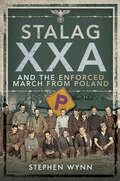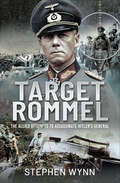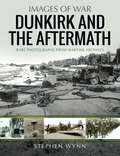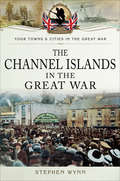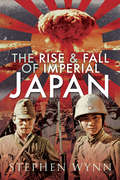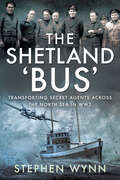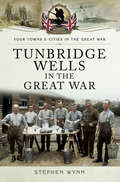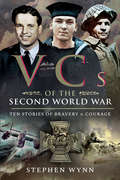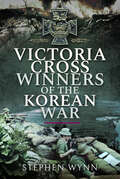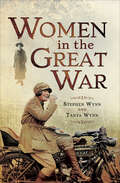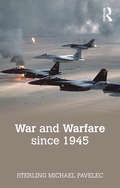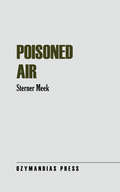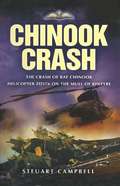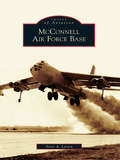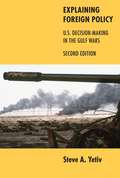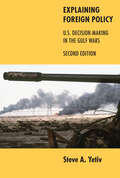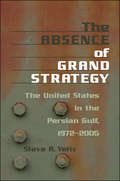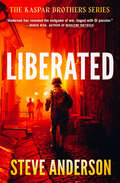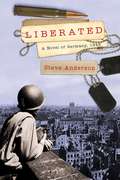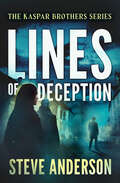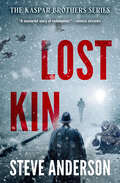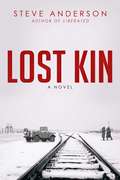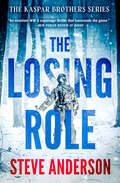- Table View
- List View
Stalag XXA Torun Enforced March from Poland
by Stephen Wynn“Based largely on a POW diary, this book sheds fresh light on the conditions facing POWs in Poland as the Nazi State collapsed . . . Very Highly Recommended.” —FiretrenchStalag XXA was a Second World War German POW camp for noncommissioned officers located in Nazi occupied Torun, in northern Poland. This book examines in detail what life was like in the camp for those held there, which over the course of the war numbered more than 60,000 men, including Polish, French, Belgians, British, Yugoslavians, Russians, Americans, Italians and Norwegians.The bulk of the book is based on a diary kept by Leonard Parker, a POW at Stalag XXA who was forced to undertake a march from the camp, commencing on January 19 1945, taking himself and his comrades to the Russian port of Odessa. It was a difficult march undertaken in harsh wintery conditions, where lack of food, the cold, and the fear of death were their constant companions. The final leg of their liberation saw the men of Stalag XXA board the Duchess of Richmond at Odessa, before arriving at Greenock, Scotland, on April 17 1945, and finally finding their freedom.“Under the format of a diary this book tells the story of Leonard Parker, his life and daily struggle of living in a prison camp . . . a great read . . . I would recommend this book to all. 5 stars.” —UK Historian
Target Rommel: The Allied Attempts to Assassinate Hitler’s General
by Stephen WynnFrom a German perspective, the highly decorated and well respected General Erwin Rommel was one of their biggest and brightest assets: a military strategist who thought ‘outside of the box’, a tactic which more than once either brought him an unexpected victory, or saved him from almost certain defeat. His reputation had been gained early in the Second World War, whilst commander of the 7th Panzer Division during the invasion of France, and as the commander of German forces during the North African campaign between 1941 and 1943. Such was his influence not only as a military strategist but on the morale of the men who served under him, as well as that of the German public, that the British government decided it needed to make concerted efforts to try to capture or eliminate him, making Rommel the only German officer of the Second World War that the allied authorities were prepared to put such time, manpower and commitment into eliminating. Two operations were put in to place to try to achieve this: Operation Flipper in November 1941, and Operation Gaff in July 1944. Both operations failed for different reasons, but just three months after the latter of the two operations, Rommel was dead, forced to commit suicide by Adolf Hitler for his part in the attempt to assassinate him on 20 July 1944. Such was the level of Rommel’s popularity and importance that the Nazi authorities reported the cause of his death to be injuries sustained in an attack on his staff car by enemy aircraft. Indeed, it was only after the war that the truth behind his death was revealed.
The Aftermath of Dunkirk: Rare Photographs from Wartime Archives (Images of War)
by Stephen WynnOperation Dynamo, the successful evacuation of Belgian, British, Dutch, French and Polish troops from the beaches at Dunkirk between 27 May and 4 June 1940, was not only a pivotal moment of the war, but one that changed its final outcome. There has been much debate in the years since the end of the war concerning the “Hitler Halt” order, which was given to German Panzer units waiting patiently on the outskirts of Dunkirk to be allowed to finish the job they had started. Many theories have been put forward as to the reasons behind this, but the consequence was that it allowed Britain to remain in the war. A total of 338,226, British and Allied troops were rescued from the beaches of Dunkirk, aboard a total of 861 vessels, of which 243 were sunk. For those left behind, official figures record that up to 80,000 French and British troops were captured, whilst during the time of the actual evacuation, somewhere in the region of 16,000 French and 1,000 British soldiers were killed. Equipment wise British forces left behind somewhere in the region of 90,000 rifles, 11,000 machine guns, huge supplies of ammunition, 880 field guns, 310 large calibre artillery pieces, 500 anti-aircraft guns, 850 anti-tank guns, 700 tanks, 45,000 cars and lorries, and 20,000 motor cycles – enough equipment to arm nearly ten divisions of soldiers. It is known that two atrocities took place during the Battle of Dunkirk: the Massacre at Le Paradis, and another at Wormhoudt, carried out by Waffen- SS soldiers, against British and French troops who had already surrendered. Although the Battle of Dunkirk must ultimately go down tactically as a German victory, the rescue of so many of its men, ensured that like a phoenix, Britain rose from the ashes of defeat to gain a great and lasting victory.
The Channel Islands in the Great War (Your Towns & Cities in the Great War)
by Stephen WynnStories of the residents of Jersey, Guernsey, and other Channel Islands and their service and sacrifice during the First World War. Before the outbreak of the First World War, the Channel Islands were scenic, sunny holiday destinations, where it was possible to briefly escape the hustle and bustle of life. But as soon as the fighting began, worries arose about the threat of a German invasion to the islands, which are much closer to the coast of France than the southern coast of Great Britain. Both men and women alike played their part. Men joined one of the islands&’ militia or enlisted in one of the numerous regiments of the British Army, including the &‘Jersey Pals&’ and the Royal Irish Fusiliers, Royal Irish Rifles, and Royal Irish Regiment. This book looks at the commitment and achievements of the Channel Islands&’ very own Royal Guernsey Light Infantry, formed in December 1916. The Islands&’ women volunteered in droves to serve with the British Red Cross&’ Voluntary Aid Detachments, not just throughout the Channel Islands, but in mainland Great Britain and further afield in Belgium, France, and beyond. Ultimately, German soldiers didn&’t set foot on the islands—except for about two thousand held captive there as prisoners of war. This book tells the story of the people of the Channel Islands and what they did during the First World War—including those who paid the ultimate price. Includes photos
The Rise & Fall of Imperial Japan
by Stephen WynnNearly a century of Japanese Imperial rule, from the 1868 Meiji Restoration to the end of WWII, is explored in this sweeping history.Under Emperor Meiji’s rule, Imperial Japan established itself as a world power through rapid industrialization and militarization. Aligned with the Entente Powers during the First World War, Japan made a proposal for racial equality at the 1919 Paris Peace Conference—only to be overruled by American President Woodrow Wilson. In the 1920s, the empire began its military conquest of numerous countries and islands throughout Asia and the Pacific regions.Author Stephen Wynn examines Japan’s various military conflicts and colonial efforts, including its invasion of China that coincided with the Second World War. The book culminates with the atomic bombs dropped on Hiroshima and Nagasaki, which finally brought about Japan’s surrender and the end of the war in Asia and the Pacific.
The Shetland 'Bus': Transporting Secret Agents Across the North Sea in WW2
by Stephen WynnA history of the World War II clandestine special operations group that linked German-occupied Norway with Scotland&’s Shetland Islands. The Shetland Bus was not a bus, but the nickname of a special operations group that set up a route across the North Sea between Norway and the Shetland Islands, north-east of mainland Scotland. The first voyage was made by Norwegian sailors to help their compatriots in occupied Norway, but soon the Secret Intelligence Service and the Special Operations Executive asked if they would be prepared to carry cargoes of British agents and equipment, as well. Fourteen boats of different sizes were originally used, and Flemington House in Shetland was commandeered as the operation&’s HQ. The first official journey was carried out by the Norwegian fishing vessel the Aksel, which left Luna Ness on 30 August 1941 on route to Bremen in Norway. This book examines that first journey, as well later ones, and discusses the agents and operations which members of the Shetland Bus were involved in throughout the war. It also looks at the donation of three submarine chasers to the operation, made in October 1943, by the United States Navy. These torpedo-type boats were 110 ft long and very fast, allowing journey times between Shetland and Norway to be greatly reduced and carried out in greater safety. The story of the Shetland Bus would be nothing without the individuals involved, both the sailors of the boats and the agents who were carried between the two countries. These were very brave individuals who helped maintain an important lifeline to the beleaguered Norwegians. It also allowed British and Norwegian agents a way into Norway so that they could liaise with the Norwegian Underground movement and carry out important missions against the German occupiers.Praise for The Shetland &‘Bus&’ &“Wynn—who has written or co-written several books on the Second World War—is to be commended for his detailed account of a captivating and understudied moment in the history of special operations. . . . Wynn&’s readable and engaging account of his subject explores the intersections of transnational, Second World War, and special operations history. As a result, it should be of interest to a wide readership.&” —The Northern Mariner &“Very highly recommended.&” —Firetrench &“A great book about individual spies and sailors from both sides of the water putting their lives at great risk. I really enjoyed this book and it was written in a bit of diary style, plenty of information and photographs. I certainly recommend this book to all.&” —UK Historian
Tunbridge Wells in the Great War (Your Towns & Cities in the Great War)
by Stephen WynnUsing original material and letters from the First World War, this captivating and eye-opening account uncovers the unnerving realities of the First World War and the impact it had on the town of Tunbridge Wells. It looks at world events, which ultimately determined the outbreak of the war, and how these same events affected the small town in Kent and the people who made up the community.From an early stage the hostilities of the war became very real for the people of Tunbridge Wells. Because of its geographical location, close proximity to major ports and rail links, the town became the headquarters of the nations Territorial Army, which brought with it 5,000 troops from all over the country.Out of nearly 3,000 people from Tunbridge Wells who enlisted in the military between 1914–1918, a staggering 801 did not return, and out of those who did, many suffered terrible wounds and injuries, both physically and mentally. Many moving stories are illustrated throughout, such as that of Private William Starks Vidler of the Royal Marines Light Infantry who became the town's first casualty of the war when his ship, HMS Amphion struck a mine and sunk. Ironically, eighteen others who died in the disaster were German sailors who had been rescued by the Amphion when their ship was sunk by the British Royal Navy.The book looks at letters sent from husbands and sons, who had seen action in the war, and how they were received by families on the Home Front, who were anxiously waiting for new of their loved ones. It documents the triumphs and tragedies of Tunbridge Wells' people as they sought to find normality amongst a reality far removed from anything they had ever known before
VCs of the Second World War: Ten Stories of Bravery & Courage
by Stephen WynnDramatic accounts of ten Victoria Cross recipients and what they did to earn this highest of honors during WWII.During the Second World War, the Victoria Cross—the highest honor to be given to British or Commonwealth forces—was awarded on 182 occasions to 181 recipients, 85 of which were bestowed posthumously.Presented here are ten examples of those who showed the utmost gallantry and bravery “in the presence of the enemy,” with each individual case and the circumstances in which the award was won examined in close detail. One example is the story of Charles Upham, 2nd Division, New Zealand Expedition Force, who was the only recipient of two Victoria Crosses: the first awarded during the Battle of Crete in 1941, and the second during fighting at El Ruweisat Ridge, Egypt, in 1942. Others include Premindra Singh Bhagat of the Indian Army, who rapidly cleared fifteen minefields despite close enemy fire and personal injury, and RAF pilot Leonard Cheshire, who received the honor after his fourth tour of duty. These and other rousing and dramatic stories are true profiles in courage.
Victoria Cross Winners of the Korean War
by Stephen WynnThe Korean War (1950-53) is often referred to by many British and Commonwealth veterans who took part in it as the 'forgotten war', a reference which does not include themselves or the families and friends of those who were killed. On 15 August 1945, US and Soviet forces liberated Korea from the Japanese and the country was subsequently divided along the 38th parallel, with the Soviets administering the northern part of the country and the Americans the south. Tensions between the two states continued, with both governments claiming to be the legitimate government of Korea. This came to a head on 25 June 1950, when the Korean People’s Army of North Korea crossed the 38th parallel into South Korea. For nearly four months the fighting swung first one way then the other, before forces from South Korea and other UN countries chased the North Koreans towards the Chinese border, which in turn saw China enter the war on the side of North Korea on 19 October. Having initially refused to send troops to Korea due to commitments in Malaya, the British government was worried about the possibility of China threatening Hong Kong, which at the time was under British control. A combination of the worsening situation in Korea, concerns about its position as a major global power, and the potential damage to its relationship with the US, caused a change of heart and, on 29 August, British forces finally arrived in South Korea. During the course of the Korean War, the Victoria Cross was awarded on just four occasions, although two other men were also awarded the equivalent George Cross. The Victoria Cross was twice awarded posthumously, with a third recipient dying in 1986 and the fourth dying in July 2018. Each of the actions which led to the awards are discussed in this book, which in the case of Bill Speakman, includes an interview he gave to the author in 2017.
Women in the Great War
by Stephen Wynn Tanya WynnA &“superlative social history&” of British women&’s efforts in WWI and how they led to the women&’s suffrage movement—includes photos (Books Monthly). In this fascinating history, husband and wife coauthors Stephen and Tanya Wynn chronicle the effects of the Great War on the lives of women, and how those experiences shaped the women&’s suffrage movement. Before the war, women were employed as domestic servants, clerical workers, shop assistants, teachers, or barmaids. But after the outbreak of World War I, women began working in munitions factories, as nurses in military hospitals, bus drivers, mechanics, and taxi drivers. They began filling jobs and social roles that had previously been reserved only for men. When the war finally came to a close, there was no going back for these determined women. Many were experiencing financial freedom for the first time and were reluctant to give up their independence. At the same time, tens of thousands of women were widowed with young children and already navigating new lives as heads of household. Chronicling the collective and individual stories of British women during the war, Women in the GreatWar demonstrates the profound and lasting impact the female war effort had on women&’s social history.
War and Warfare since 1945 (The Making of the Contemporary World)
by Sterling M. PavelecBeginning with an exploration into the question of what war is, War and Warfare since 1945 provides a chronological analysis of military history since the end of World War II extending through to an analysis of the limits of modern warfare in the nuclear age with the purpose of examining why war occurs and how it is carried out. Among the types of conflict considered within the book are: state conflicts civil wars proxy wars terrorism and counterterrorism insurgency genocide. Both theoretical and historical, War and Warfare since 1945 also explores the definitions, ethics, morals, and effects of the use of militaries in and after war, and puts forward important questions about how wars are resolved. The wars discussed include the first Arab-Israeli War, the Chinese Civil War, the Korean War, the Cold War, the Vietnam War, and the Iraq war. The book concludes with an investigation into modern war and speculation on the changing face of warfare.
Poisoned Air
by Sterner MeekAgain Dr. Bird closes with the evil Saranoff—this time near the Aberdeen Proving Ground, in a deadly, mysterious blanket of fog.
Chinook Crash: The Crash of RAF Chinook Helicopter ZD576 on the Mull of Kintyre (Aviation Ser.)
by Steuart CampbellThe 1994 crash of Chinook with top Northern Ireland intelligence experts on board into the Mull of Kintyre has remained the source of intense speculation ever since. The book is not only a full account of the incident and the subsequent on-going controversy over blame, but also attempts to solve the mystery about this accident. After the accounts of those who witnessed the crash or communicated with the aircraft on its fateful journey, the book analyses the activities of the crew on the day in question, including the maintenance record and the behaviour of the aircraft. This book will largely justify the claim of the RAF heirarchy that the cause was gross negligence by the crew, but not for the reason they give.
McConnell Air Force Base (Images of Aviation)
by Steve A. LarsenBeginning from its earliest days as an empty parcel of pasture that became a major hub airport for transcontinental air travel to its present use as the busiest refueling operation in the U.S. Air Force, the slice of land known as McConnell Air Force Base is inextricably connected to aviation to nearly the dawn of manned flight. Its military history began in 1941 with the arrival of the Air National Guard, and the base grew to a multifaceted operation that extends air power globally through intelligence and air refueling missions performed by its three partner units: the 22nd Air Refueling Wing, the 184th Intelligence Wing, and the 931st Air Refueling Group. This book offers a glimpse into the military history of McConnell Air Force Base through many rarely seen or previously unpublished images drawn primarily from the repository of the 22nd Air Refueling Wing Office of History and the Kansas Aviation Museum.
Explaining Foreign Policy: U.S. Decision-Making in the Gulf Wars
by Steve A. YetivSteve A. Yetiv has developed an interdisciplinary, integrated approach to studying foreign policy decisions, which he applies here to understand better how and why the United States went to war in the Persian Gulf in 1991 and 2003. Yetiv's innovative method employs the rational actor, cognitive, domestic politics, groupthink, and bureaucratic politics models to explain the foreign policy behavior of governments. Drawing on the widest set of primary sources to date-including a trove of recently declassified documents-and on interviews with key actors, he applies these models to illuminate the decision-making process in the two Gulf Wars and to develop theoretical notions about foreign policy. What Yetiv discovers, in addition to empirical evidence about the Persian Gulf and Iraq wars, is that no one approach provides the best explanation, but when all five are used, a fuller and more complete understanding emerges. Thoroughly updated with a new preface and a chapter on the 2003 Iraq War, Explaining Foreign Policy, already widely used in courses, will continue to be of interest to students and scholars of foreign policy, international relations, and related fields.
Explaining Foreign Policy: U.S. Decision-Making in the Gulf Wars
by Steve A. YetivSteve A. Yetiv has developed an interdisciplinary, integrated approach to studying foreign policy decisions, which he applies here to understand better how and why the United States went to war in the Persian Gulf in 1991 and 2003. Yetiv’s innovative method employs the rational actor, cognitive, domestic politics, groupthink, and bureaucratic politics models to explain the foreign policy behavior of governments. Drawing on the widest set of primary sources to date—including a trove of recently declassified documents—and on interviews with key actors, he applies these models to illuminate the decision-making process in the two Gulf Wars and to develop theoretical notions about foreign policy. What Yetiv discovers, in addition to empirical evidence about the Persian Gulf and Iraq wars, is that no one approach provides the best explanation, but when all five are used, a fuller and more complete understanding emerges.Thoroughly updated with a new preface and a chapter on the 2003 Iraq War, Explaining Foreign Policy, already widely used in courses, will continue to be of interest to students and scholars of foreign policy, international relations, and related fields.
The Absence Of Grand Strategy: The United States In The Persian Gulf, 1972-2005
by Steve A. YetivGreat powers and grand strategies. It is easy to assume that the most powerful nations pursue and employ consistent, cohesive, and decisive policies in trying to promote their interests in regions of the world. Popular theory emphasizes two such grand strategies that great powers may pursue: balance of power policy or hegemonic domination. But, as Steve A. Yetiv contends, things may not always be that cut and dried. <p><p> Analyzing the evolution of the United States' foreign policy in the Persian Gulf from 1972 to 2005, Yetiv offers a provocative and panoramic view of American strategies in a region critical to the functioning of the entire global economy. Ten cases—from the policies of the Nixon administration to George W. Bush's war in Iraq—reveal shifting, improvised, and reactive policies that were responses to unanticipated and unpredictable events and threats. In fact, the distinguishing feature of the U.S. experience in the Gulf has been the absence of grand strategy. <p> Yetiv introduces the concept of "reactive engagement" as an alternative approach to understanding the behavior of great powers in unstable regions. At a time when the effects of U.S. foreign policy are rippling across the globe, The Absence of Grand Strategy offers key insight into the nature and evolution of American foreign policy in the Gulf.
The Absence of Grand Strategy: The United States in the Persian Gulf, 1972–2005
by Steve A. YetivGreat powers and grand strategies. It is easy to assume that the most powerful nations pursue and employ consistent, cohesive, and decisive policies in trying to promote their interests in regions of the world. Popular theory emphasizes two such grand strategies that great powers may pursue: balance of power policy or hegemonic domination. But, as Steve A. Yetiv contends, things may not always be that cut and dried. Analyzing the evolution of the United States' foreign policy in the Persian Gulf from 1972 to 2005, Yetiv offers a provocative and panoramic view of American strategies in a region critical to the functioning of the entire global economy. Ten cases—from the policies of the Nixon administration to George W. Bush's war in Iraq—reveal shifting, improvised, and reactive policies that were responses to unanticipated and unpredictable events and threats. In fact, the distinguishing feature of the U.S. experience in the Gulf has been the absence of grand strategy.Yetiv introduces the concept of "reactive engagement" as an alternative approach to understanding the behavior of great powers in unstable regions. At a time when the effects of U.S. foreign policy are rippling across the globe, The Absence of Grand Strategy offers key insight into the nature and evolution of American foreign policy in the Gulf.
Nothing But A Smile
by Steve AmickIn his utterly charming story of a World War II veteran and an enterprising pinup girl, Steve Amick has created a beautifully understated love letter to an America of harder times and simpler choices. It's 1944, and Wink Dutton, a former illustrator for Yank and Stars and Stripes, arrives in Chicago after an injury to his drawing hand gets him discharged. Renting a room above the camera shop run by Sal Chesterton-the wife of Wink's buddy, still stationed in the Philippines-Wink is surprised to learn how Sal is making ends meet: producing pinup photos for the soldiers' girlie magazines. In fact, she's using herself as a model. When Wink becomes a partner in her covert enterprise, it's the beginning of a collaboration that is both wonderfully sexy and pure, one that not only leads to Wink's reinvention as a photographer but also-amid the painful adjustments of the postwar world-blossoms into a subtle and unexpected romance.
Liberated (The Kaspar Brothers)
by Steve AndersonAn American captain in post-WWII Germany must stop a criminal conspiracy by his fellow officers in this historical thriller by the author of The Losing Role. Germany, May, 1945. With the war just over, Capt. Harry Kaspar is about to take a new posting in the US occupation—running a Bavarian town named Heimgau. When Harry loses the command to a rival, he&’ll do almost anything to win the job back. Then Harry discovers a horrific scene: three German men tortured and murdered. Solving the crime could teach the locals about American justice—and help him reclaim his posting. But as Harry&’s quest for the killer leads him back to American officers, he uncovers a criminal network plundering the war-torn land for all its worth. Now, for justice to mean anything at all, Harry must fight back.
Liberated: A Novel of Germany, 1945 (Kaspar Brothers Ser.)
by Steve AndersonCan a lone American captain rescue justice in war-torn Germany?It's May 1945, the war's just over, and Harry Kaspar, an American captain in Germany, is about to take a new posting in the US occupation-running a Bavarian town named Heimgau. When Harry loses the command to Major Membre, he'll do almost anything to win the job back.When Harry discovers a horrific scene-three German men tortured and murdered-he reckons that solving the crime could teach the conquered townspeople about American justice, as well as help him reclaim that better posting. The only problem is that Harry's quest for the real killer will lead him straight back to his commander, Membre, and eventually to his mentor, a can-do rebel US colonel named Spanner. Spanner is a gangster run rampant, plundering the war-torn land for all its grim worth.Harry's lover, Katarina, a gutsy German actress, helps him realize he must fight back. Recognizing that absolute power corrupted and then destroyed Major Membre and Colonel Spanner, Harry takes it upon himself to overcome any obstacle that gets in his way and set a new American example by which a terrorized town and a mix of battered peoples can rise up from the ashes of a brutal, demoralizing war.
Lines of Deception (The Kaspar Brothers)
by Steve AndersonA West German nightclub owner goes behind the Iron Curtain on a desperate mission to save his brother, in this Cold War thriller by the author of Lost Kin.West Germany, 1949. Former actor Max Kaspar suffered greatly in the Second World War. Now he owns a nightclub in Munich—and occasionally lends a hand to the newly formed CIA. Meanwhile, his brother Harry has ventured beyond the Iron Curtain to rescue an American scientist. When Harry is also taken captive, Max resolves to locate his brother at all costs. The last thing he expects is for Harry to go rogue. Max&’s treacherous quest takes him to Vienna and Prague to Soviet East Germany and Communist Poland. Along the way, dangerous operators from Harry&’s past join the pursuit: his former lover Katarina, who&’s working for the Israelis, and former Nazi Hartmut Dietz, now an agent of East German intelligence. But can anyone be trusted? Even the American scientist Stanley Samaras may not be the hero Harry had believed him to be . . .
Lost Kin (The Kaspar Brothers)
by Steve AndersonBrothers divided by WWII reunite on a mission of justice in the chaos of early Cold War Europe in this historical espionage thriller. Occupied Munich, 1946: Irina, a Cossack refugee, confesses to murdering a GI, but American captain Harry Kaspar doesn&’t buy it. As Harry scours the devastated city for the truth, it leads him to his long-lost German brother, Max, who returned to Hitler&’s Germany before the war. Max has a questionable past, and he needs Harry for the cause that could redeem him: rescuing Irina&’s stranded clan of Cossacks. Disowned by the Allies, they are now being hunted by Soviet death squads—the cold-blooded upshot of a callous postwar policy. As a harsh winter brews and the Cold War looms, Harry and Max embark on a desperate rescue mission along the German-Czech border. As a mysterious figure shadows them, everyone is suspect—even those who have pledged to help. But before the Kaspar brothers can save the innocent victims of peace, grave secrets threaten to damn them all.
Lost Kin: A Novel (Kaspar Brothers Ser.)
by Steve AndersonReunited brothers confront a secret Allied betrayal in postwar Munich. Occupied Munich, 1946: Irina, a Cossack refugee, confesses to murdering a GI, but American captain Harry Kaspar doesn’t buy it. As Harry scours the devastated city for the truth, it leads him to his long-lost German brother, Max, who returned to Hitler’s Germany before the war. Max has a questionable past, and he needs Harry for the cause that could redeem him: rescuing Irina’s stranded clan of Cossacks who have been disowned by the Allies and are now being hunted by Soviet death squads?the cold-blooded upshot of a callous postwar policy. As a harsh winter brews, the Soviets close in and the Cold War looms, Harry and Max desperately plan for a risky last-ditch rescue on a remote stretch of the German-Czech border. A mysterious visitor from Max’s darkest days shadows them. Everyone is suspect, including Harry’s lover, Sabine, and Munich detective Hartmut Dietz?both of whom have pledged to help. But before the Kaspar brothers can save the innocent victims of peace, grave secrets and the deep contempt sown during the war threaten to damn them all. Skyhorse Publishing, as well as our Arcade, Yucca, and Good Books imprints, are proud to publish a broad range of books for readers interested in fiction?novels, novellas, political and medical thrillers, comedy, satire, historical fiction, romance, erotic and love stories, mystery, classic literature, folklore and mythology, literary classics including Shakespeare, Dumas, Wilde, Cather, and much more. While not every title we publish becomes a New York Times bestseller or a national bestseller, we are committed to books on subjects that are sometimes overlooked and to authors whose work might not otherwise find a home.
The Losing Role (The Kaspar Brothers)
by Steve AndersonA German actor conscripted into WWII will play the role of his life as he makes a daring escape in this espionage thriller inspired by true events. When the SS orders banned entertainer Max Kaspar to impersonate a US officer during the Battle of the Bulge, Max devises his own secret mission to escape the war and flee to America. With his career in Germany over, this plan is his big break—and his last chance. But Max&’s mission is doomed from the start. Trapped between the lines in the freezing Ardennes Forest, he must summon all of his acting talents and newfound courage to evade perilous traps laid by both sides. Inspired by a real-life 1944 operation, this gripping wartime thriller is the first book in the Kaspar Brothers series.
